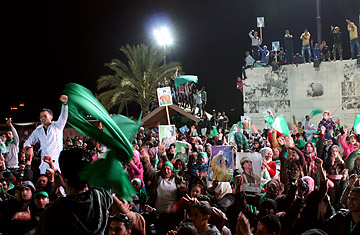
Libyan demonstrate their support to leader Muammar Gaddafi early April 1, 2011, gathering as human shield in front of his residence in the Tripoli suburb of Bab Laziziya which has been targeted on March 20 by a coalition airstrike.
When gunfire breaks out in Tripoli, it pushes a city on edge into paroxysms of speculation and rumor. The gunfire was heard in the early hours of Thursday, and went on in staccato bursts for a little more than an hour. It took place outside the Rixos Hotel, where the journalists stay, which is just a few minutes' walk to Muammar Gaddafi's Bab al Aziziya compound. Witnesses to the aftermath described "pools of blood" on the streets. "But you won't find anything now," a resident, who cannot be named in order to protect his safety, told me a few hours later. "The fire trucks came to hose it all down." A friend quipped, "They probably used shampoo to make sure they got it all up." Dark humor has become the trademark of Libyans in a town with little reasons to laugh.
The fight, I was told, took place between a small band of rebel boys from the restive neighborhoods of Tajoura and Souk al Juma, armed with stolen weapons, and Gaddafi's volunteer militia — civilians given arms by the government. The reasons are unclear. The Libyan speaking to me surmised that the rebels, some 30 in total, were attempting to make a show of force at the gate to Gaddafi's compound, but no one knows for sure. What is clear, he told me, is what happened next: the security forces intervened, stopped the fighting and captured the rebels. The Libyan, who comes from those neighborhoods, didn't think any had been killed, though there had been plenty of injuries he said.
At a press conference that evening, Government Spokesman Moussa Ibrahim swatted away questions about the early morning conflagration. "I always try to advise my friends not to celebrate by shooting in the air," he sighed with mock exasperation. "But it is a genuine Arab tradition. As far as I know there was no fighting in Tripoli last night. People heard good news, so they were shooting in the air." The good news? There had been no airstrikes on the city that night.
I asked the Libyan witness to the post-shooting cleanup what he thought would happen to those rebels he said had been captured by the security forces. "They will disappear of course. And next time there is an airstrike, they [the authorities] will bring out their bodies and say they were civilian casualties." I asked him if he really believed that, or if he was just being cynical. "I believe they will do anything," he replied.
Apparently, so does Amnesty International, which just released a report detailing an alleged government campaign of enforced disappearances throughout the country. Ibrahim slammed the report in his press conference, saying: "We are fed up. [International human rights organizations like Human Rights Watch and Amnesty International] are losing credibility. They are making wild claims about our abuses of human rights, against prisoners of war and armed rebels. ... They are sitting in Benghazi, where the terrorists are, and making claims about what is happening in Tripoli."
He went on to explain that in a situation of war it is inevitable that people disappear. But just because something bad happens, the government should not be blamed. "First of all, hundreds of young Libyan boys were tricked into joining the revolution. They go to join with no papers, no I.D. Some die, some escape and some are traumatized and go to the hospital. They are either killed or taken by the army. We do not kidnap people."
A question about a ceasefire proposed by the rebel National Opposition Council elicited a furious tirade. "It's a trick," said Ibrahim, explaining that the conditions — Gaddafi's forces withdraw from the cities and allow peaceful protests — were impossible. "You're not offering peace if you're making impossible demands," he said. "We will not leave our cities. We will not stop protecting our civilians. If you want peace, you leave things as they are."
The press conference, of course, had been called to complain about airstrike-inflicted civilian casualties. As Ibrahim spoke, video footage of wounded women, children and men being treated at a hospital rolled on the screen behind him. He offered to take journalists to the town of Bou Aqoub, near the oil town of Brega, to see for ourselves the civilian dead. I couldn't help but wonder if the bodies in Bou Aqoub look anything like the rebels in Tripoli.
